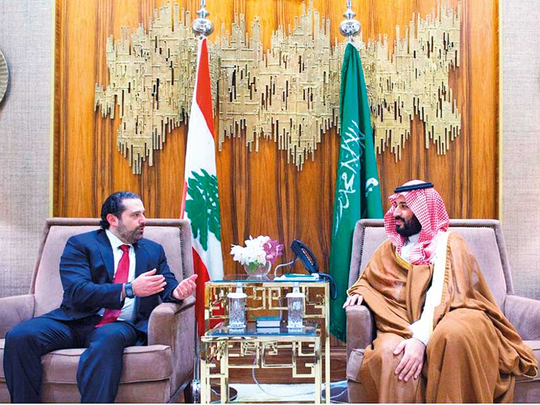
Beirut: Five former Lebanese leaders have sent an unprecedented letter to the Arab League warning over pro-Hezbollah stances in their country.
The three-page letter penned by former presidents Michel Sulaiman, Amin Gemayel, as well as former prime ministers, Fuad Siniora, Tamam Salam and Najib Mikati, highlighted five issues of concern that stood unresolved in Lebanon:
(1) adherence to the Taif Accords that called for a full dismantlement of all militias; (2) compliance with international obligations, chiefly UN Security Council Resolution 1701, which authorised the Lebanese Army to return to the border with Israel; (3) the proliferation of illegal arms in Lebanon; (4) the 2012 Baabda Declaration that emphasised the country’s neutrality regarding regional conflicts; and (5) the means to prevent interference in the Syrian crisis.
The officials issued the letter on the heels of the Arab Summit meeting which was held in Jordan on Wednesday, where Lebanese President Michel Aoun’s speech was interpreted as ‘preachy’ by Riyadh.
During his speech, Aoun who was elected late last year to the presidency after a two-year vacuum, said the Arab League “must regain its role and mission in virtue of the principles, objectives and spirit of its charter in order to preserve its member states and to save its people, its sovereignty, its independence and its wealth”.
Lebanese parliament speaker, Nabih Berri, slammed the letter and reminded its signatories of the various Israeli wars on Lebanon.
He said 13 previous Arab Summits had endorsed the army-people-resistance equation and the liberation of the south of Lebanon, although the latest Arab League communiqué made no such reference.
Both Berri, a Shiite, and Aoun, a Maronite Christian, are part of a political alliance in the country with leanings towards Hezbollah, Syria and Iran.
While Prime Minister Sa’ad Hariri said the letter did not represent the official stance of Lebanon, the Sunni leader was aware that it reflected the sentiments of a vast segment of the population who stand opposed to Hezbollah.
At the end of the Arab Summit however, Lebanon did sign on to the final communiqué, which chastised Iran, and further secured Beirut in the Arab fold.
Saudi Arabia, aware of Hariri’s political straitjacket, invited him to Riyadh for further consultations.
By doing so, Riyadh hoped to send a message to Tehran that despite Aoun’s pro-Hezbollah positions, Lebanon was still and will always be a sovereign Arab state.
Hariri met with Deputy Crown Prince Mohammad Bin Salman, who is also the Chairman of the powerful Council for Economic and Development Affairs.












